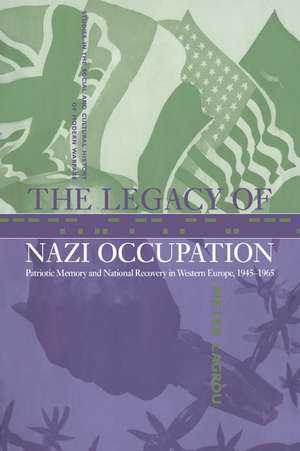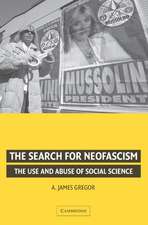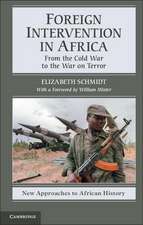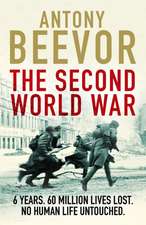The Legacy of Nazi Occupation: Patriotic Memory and National Recovery in Western Europe, 1945–1965: Studies in the Social and Cultural History of Modern Warfare, cartea 8
Autor Pieter Lagrouen Limba Engleză Paperback – 9 sep 2007
| Toate formatele și edițiile | Preț | Express |
|---|---|---|
| Paperback (1) | 209.44 lei 43-57 zile | |
| Cambridge University Press – 9 sep 2007 | 209.44 lei 43-57 zile | |
| Hardback (1) | 781.65 lei 43-57 zile | |
| Cambridge University Press – 12 feb 1999 | 781.65 lei 43-57 zile |
Din seria Studies in the Social and Cultural History of Modern Warfare
-
 Preț: 177.86 lei
Preț: 177.86 lei -
 Preț: 279.33 lei
Preț: 279.33 lei -
 Preț: 199.05 lei
Preț: 199.05 lei -
 Preț: 205.41 lei
Preț: 205.41 lei -
 Preț: 230.57 lei
Preț: 230.57 lei -
 Preț: 188.94 lei
Preț: 188.94 lei -
 Preț: 275.66 lei
Preț: 275.66 lei -
 Preț: 203.42 lei
Preț: 203.42 lei -
 Preț: 178.15 lei
Preț: 178.15 lei -
 Preț: 279.96 lei
Preț: 279.96 lei -
 Preț: 325.91 lei
Preț: 325.91 lei -
 Preț: 231.63 lei
Preț: 231.63 lei -
 Preț: 345.73 lei
Preț: 345.73 lei -
 Preț: 202.90 lei
Preț: 202.90 lei - 8%
 Preț: 530.54 lei
Preț: 530.54 lei -
 Preț: 200.34 lei
Preț: 200.34 lei -
 Preț: 156.72 lei
Preț: 156.72 lei -
 Preț: 232.44 lei
Preț: 232.44 lei -
 Preț: 313.34 lei
Preț: 313.34 lei - 9%
 Preț: 627.64 lei
Preț: 627.64 lei -
 Preț: 230.49 lei
Preț: 230.49 lei -
 Preț: 284.17 lei
Preț: 284.17 lei -
 Preț: 285.37 lei
Preț: 285.37 lei -
 Preț: 274.88 lei
Preț: 274.88 lei - 11%
 Preț: 699.86 lei
Preț: 699.86 lei - 11%
 Preț: 586.47 lei
Preț: 586.47 lei - 11%
 Preț: 587.49 lei
Preț: 587.49 lei -
 Preț: 222.33 lei
Preț: 222.33 lei -
 Preț: 287.28 lei
Preț: 287.28 lei - 11%
 Preț: 582.88 lei
Preț: 582.88 lei -
 Preț: 282.26 lei
Preț: 282.26 lei -
 Preț: 285.37 lei
Preț: 285.37 lei -
 Preț: 285.75 lei
Preț: 285.75 lei -
 Preț: 285.37 lei
Preț: 285.37 lei -
 Preț: 206.77 lei
Preț: 206.77 lei -
 Preț: 178.78 lei
Preț: 178.78 lei - 11%
 Preț: 642.35 lei
Preț: 642.35 lei
Preț: 209.44 lei
Nou
Puncte Express: 314
Preț estimativ în valută:
40.08€ • 41.96$ • 33.16£
40.08€ • 41.96$ • 33.16£
Carte tipărită la comandă
Livrare economică 07-21 aprilie
Preluare comenzi: 021 569.72.76
Specificații
ISBN-13: 9780521041478
ISBN-10: 0521041473
Pagini: 344
Ilustrații: 12 b/w illus.
Dimensiuni: 150 x 227 x 18 mm
Greutate: 0.5 kg
Editura: Cambridge University Press
Colecția Cambridge University Press
Seria Studies in the Social and Cultural History of Modern Warfare
Locul publicării:Cambridge, United Kingdom
ISBN-10: 0521041473
Pagini: 344
Ilustrații: 12 b/w illus.
Dimensiuni: 150 x 227 x 18 mm
Greutate: 0.5 kg
Editura: Cambridge University Press
Colecția Cambridge University Press
Seria Studies in the Social and Cultural History of Modern Warfare
Locul publicării:Cambridge, United Kingdom
Cuprins
List of illustrations; Acknowledgements; List of abbreviations; Introduction; Part I. Troublesome Heroes: The Post-War Treatment of Resistance Veterans: 1. Approaching victory and re-establishing the state; 2. Heroes of a nation: Belgium and France; 3. A nation of heroes: the Netherlands; Part II. Repatriating Displaced Populations from Germany: 4. Displaced populations; 5. The challenge to the post-war state: Belgium and the Netherlands; 6. Pétain's exiles and De Gaulle's deportees; Part III. The Legacy of Forced Economic Migration: 7. Labour and total war; 8. Moral panic: 'the soap, the suit and above all the Bible'; 9. Patriotic scrutiny; 10. 'Deportation': the defence of the labour conscripts; Part IV. Martyrs and Other Victims of Nazi Persecution; 11. Plural persecutions; 12. National martyrdom; 13. Patriotic memories and the genocide; 14. Remembering the war and legitimising the post-war international order; Conclusion; Bibliography; Index.
Recenzii
"Drawing extensively on archival records, [Lagrou] underlines the divergence between ambiguous experiences of occupation and the univocal post-war patriotic narratives." Reference & Research Book News
"...remarkably well-researched and rigorously comparative book about the way resisters, deportees, and forced laborers were or were not incorporated into the political landscape of postwar France, Belgium, and the Netherlands. Lagrou is to be congradulated for this excellent contribution to the social history of the Second World War." The Journal of Military History
"...well worth reading..." Journal of Modern History
"This is a kind of closely contextualized comparative history...that historians will admire, not least for its capacity to accommodate unpredictable and even anomalous findings. Overall, the great merit of the book is that it will encourage scholars who specialize in the history of a single country to think about their subject with new and broader questions in mind. In that respect, it is a splendid vindication of the comparative method." The International History Review
"...meticulous in its research and thoughtful in its conclusions." Choice
"As a lean and sinewy study of the consequences of Nazi occupation, this book is spendid." American Historical Review
"...remarkably well-researched and rigorously comparative book about the way resisters, deportees, and forced laborers were or were not incorporated into the political landscape of postwar France, Belgium, and the Netherlands. Lagrou is to be congradulated for this excellent contribution to the social history of the Second World War." The Journal of Military History
"...well worth reading..." Journal of Modern History
"This is a kind of closely contextualized comparative history...that historians will admire, not least for its capacity to accommodate unpredictable and even anomalous findings. Overall, the great merit of the book is that it will encourage scholars who specialize in the history of a single country to think about their subject with new and broader questions in mind. In that respect, it is a splendid vindication of the comparative method." The International History Review
"...meticulous in its research and thoughtful in its conclusions." Choice
"As a lean and sinewy study of the consequences of Nazi occupation, this book is spendid." American Historical Review
Descriere
This book analyses how France, Belgium and the Netherlands emerged from the Second World War.















